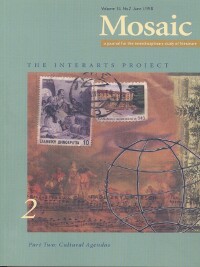Issue 31.2
Overview

Special Issue: The Interarts Project II: Cultural Agendas
Published: June 1998
View the issue introduction or see the issue summary and contents below.
9 essays, totalling 192 pages
$14.95 CAD
In the second of four special issues, Mosaic moves from asking how the arts are interrelated to asking what the arts do as culture and what is culture for the arts. What is culture, what is art, and is there anything specifically cultural about art? In this spirit, this issue offers essays that explore Japonisme and the creation of European Modernism; the political semiotics of home furnishing in nineteenth-century France; the imperialism of musical taste in Victorian England; how the Russian Acmeists used ekphrasis to move beyond mere aesthetics; how the “thingification” of the word in the Czech Republic creates new semiotic meaning; how Canada’s musical and artistic identity is shaped by the “North”; architectural metaphors, perception, and exile in Abdelwahab Meddeb; whiteness, race, and the Jazz traditions; and the power of representation in dictatorial Nigeria.
Japonisme: East-West Renaissance in the Late 19th CenturyYoko Chiba Ranging across the arts–painting, literature, theater–this essay explores the different phases of and attitudes toward the assimilation of Japanese aesthetics and practice in late 19th-century Britain and France. Focus is on the way that Japonisme underlaid the various movements that constitute Modernism. | |
The Micropolitics of Home Decorating in 19th-century FranceJanell Watson During the 19th century in France, the qualifier “artistic” often served to describe, judge, and market home furnishings. This essay shows how the idea of the artistic interior becomes entangled in class and gender politics, and how this social politics of taste was criticized by various 19th-century novelists even as they also aided its dissemination. | |
Musicology as Propaganda in Victorian Theory and PracticeSharon Hamilton Drawing upon the mid-19th century discipline of comparative musicology, wherein European music was thought to symbolize a cultural and philosophical ideal this essay explores the way that Rudyard Kipling used such ideas in poems like “Mandalay” and how he ascribed to the “Hammerstein principle”—i.e., “breaking into song”—in the interests of the imperialist emotion. | |
The “Telling” Image: Ecphrasis in Russian Acmeist VerseMaria Rubins Focusing on a group of early 20th-century Russian poets known as the Acmeists, this essay examines the cultural implications of the portrayal of the visual arts in verse. The poets’ treatment of such issues as national identity, East and West, gender, and mass culture, reveal their ability to transcend the ostensibly aestheticist nature of their art. | |
Sensuous Iconicity: The Manifestoes and Tactics of Czech PoetismMalynne M. Sternstein Within the context of early 20th-century avant-garde concerns with concretizing the poetic word, and with a view to suggesting the social implications of such practice, this essay focuses on the work of the Czech Poetists and shows how their attempts at a sensuous “thingification” of the word can be related to semiotic theories of iconicity. | |
From Landscape to Soundscape: The Northern Arts of CanadaSherrill Grace and Stefan Haag This interdisciplinary study of classical music by contemporary Canadian composers situates their music in the context of northern imagery and nationalist rhetoric by exploring links between music and painting, poetry, and installation art. Specific attention is given to composer R. Murray Schafer’s manifesto on Canada’s northern identity, Music in the Cold. | |
Phantasmatic Artifacts: Postcolonial Meditations by a Tunisian ExileSuzanne Gauch Exploring manipulations of perception in postcolonial representations, Abdelwahab Meddeb’s novel Phantasia employs architecture as a metaphor for the construction of identities and ideologies and uses the concept of exile to expose the politics of representation which inform cultural artifacts, and through them, history. | |
Singing the Blues / Reclaiming Jazz: Toni Morrison and Cultural MourningRoberta Rubenstein “Cultural mourning” connotes the response of African Americans not only to the lost lives and lost possibilities produced by slavery but also to the loss of cultural productions through appropriation by white culture. In her 1992 novel, Jazz, Morrison re-claims black music both by reconceptualizing the Jazz Age and by employing the literary equivalents of its musical forms. | |
Inter/art/iculations of Violence in Contemporary Nigerian Poetry and Graphic ArtObododimma Oha Focusing on a recent collection of poems and graphic art, this essay explores their joint articulation of violence and violation in the contemporary military rulership of Nigeria. The interaction of the art forms at the discursive plane implicitly subverts the univocal tradition of the dictatorship. |